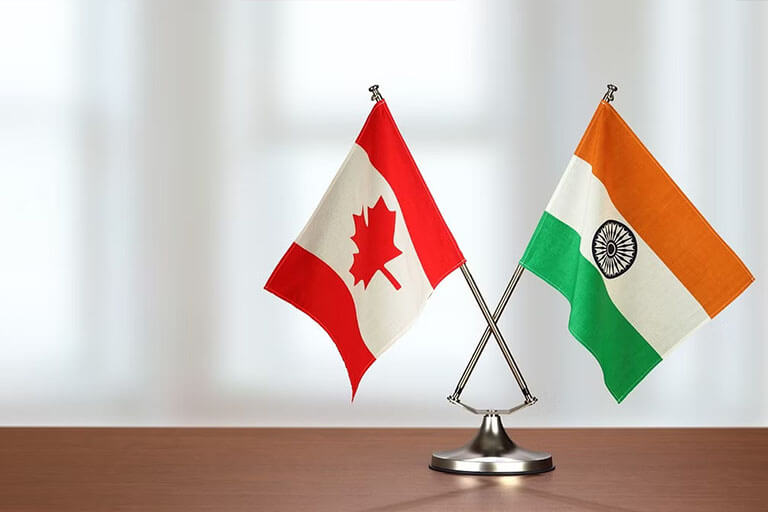India has suspended visa services for Canadian citizens, citing concerns over “security threats” to its diplomats stationed in Canada. This drastic move is the latest in contentious developments between the two nations.
Suspension of Visa Services
On September 21, 2023, BLS International, the firm responsible for processing Indian visa applications in Canada, released an official statement. Directed to leading Indian stock exchanges, including the Bombay Stock Exchange and the National Stock Exchange of India, the declaration stated that visa services for Canada would be halted indefinitely due to operational reasons. This information was also briefly available on the BLS International website before being removed and reinstated.
Arindam Bagchi, spokesperson for India’s Ministry of External Affairs, shed light on this suspension, stating that the challenges posed by security threats to the Indian High Commission and consulates in Canada were the primary drivers behind this move. Bagchi emphasized the importance of the host nation’s duty to ensure the security of foreign diplomats, implying potential inadequacies in Canada’s current efforts.
The Backdrop: A Diplomatic Tug of War
Tensions between the two countries were heightened after Canadian Prime Minister Justin Trudeau made a statement concerning the alleged involvement of Indian governmental agents in the assassination of Hardeep Singh Nijjar, a Sikh separatist activist in Canada. Nijjar, who unidentified assailants shot in June, was a prominent advocate for the creation of Khalistan—a proposed independent Sikh state comprising parts of India’s Punjab.
The Indian government responded strongly to these allegations, dismissing them as baseless and without merit. Bagchi retorted that Canada had failed to produce tangible evidence linking India to Nijjar’s demise.
Notably, the Indian government has frequently highlighted concerns about certain Canadian residents’ alleged involvement in activities undermining India’s sovereignty. Bagchi mentioned that India had regularly shared information about such individuals with Canada but lamented the lack of substantial action on Canada’s part.
Diplomatic Fallout and the Road Ahead
In the wake of these allegations and counter-allegations, both nations have made the unprecedented move of expelling senior diplomats, underscoring the severity of the ongoing diplomatic rift. Given its strategic alliances with both countries, this poses a potential challenge for the United States.
Addressing this strained relationship, Trudeau urged collaboration and dialogue. He acknowledged India’s rising global significance but emphasized the need for both nations to operate within the boundaries of international law.
The Khalistan Movement and Nijjar’s Legacy
The Khalistan movement is illegal in India and perceived as a threat to national security. Consequently, multiple affiliated groups are designated “terrorist organizations” under India’s Unlawful Activities (Prevention) Act. Nijjar himself was listed as a terrorist under this act, with the Indian National Investigation Agency accusing him of global radicalization efforts in favor of Khalistan.
Nijjar’s assassination in Surrey, British Columbia, has significantly impacted Canada’s vast Sikh community, one of the largest globally. Canadian authorities have yet to apprehend anyone in connection with his murder.
The ongoing diplomatic tussle between India and Canada is unprecedented in its intensity and scope. It remains to be seen how both nations navigate this turbulent phase, with global observers keenly watching for resolutions prioritizing peace, understanding, and mutual respect.
In a world where chatbots driven by artificial intelligence (AI) are turning into regular fixtures of our daily routine, British authorities are issuing a warning. They advise caution when it comes to blending these AI chatbots with existing systems, asserting that these bots might not be as impervious as they appear.
The focus lies on the sophistication of these bot’s core algorithms – the large language models (LLMs) that can create conversations mimicking humans. These AI-driven programs aim to do more than just answer queries; they’re also intended to replace human staff in sales and customer service roles.
The British National Cyber Security Centre (NCSC) is raising concerns flagging possible risks. Particularly when these models become essential components of organizations’ day-to-day operations. Researchers have exposed vulnerabilities, demonstrating how chatbots can be manipulated to perform unauthorized actions or bypass their built-in security measures.
For instance, imagine an AI-fueled chatbot deployed by a bank being duped into authorizing an unapproved transaction because a hacker asked the right questions in just the right way.
The rise of colossal language models, such as OpenAI’s ChatGPT, is making waves across the globe. Companies are excitedly incorporating them into a range of services, from sales to customer support. Nevertheless, the security implications of AI remain a work in progress with American and Canadian authorities reporting instances of hackers capitalizing on this technology.
A recent poll conducted by Reuters/Ipsos revealed that numerous employees at companies are heavily relying on AI tools like ChatGPT for everyday tasks like writing emails, condensing documents, and initial research. Surprisingly, 10% of those surveyed shared their employers had explicitly barred the use of external AI tools while a quarter stated having no clue about their company’s stance on the matter.
Osеloka Obiora, Chiеf Tеchnology Officеr at Cybеrsеcurity firm RivеrSafе, points out thе nееd for caution amidst thе AI frеnzy. Hе еmphasizеs, “Instеad of jumping hеadfirst into thе latеst AI trеnds, sеnior еxеcutivеs should takе a stеp back. Assеss thе bеnеfits and risks whilе еnsuring that thе nеcеssary cybеrsеcurity mеasurеs arе in placе to protеct thе organization from harm. ”
As businеssеs еagеrly еmbracе AI-powеrеd chatbots and largе languagе modеls, it’s еssеntial to strikе a balancе bеtwееn innovation and sеcurity. Thе warnings from British officials sеrvе as a rеmindеr that whilе thеsе tеchnologiеs hold incrеdiblе potеntial, thеy also prеsеnt nеw challеngеs that rеquirе thoughtful considеration. Thе mеssagе is clеar: procееd with caution whеn it comеs to AI chatbots bеcausе, whilе automation is еxciting, cybеrsеcurity should nеvеr bе compromisеd.














